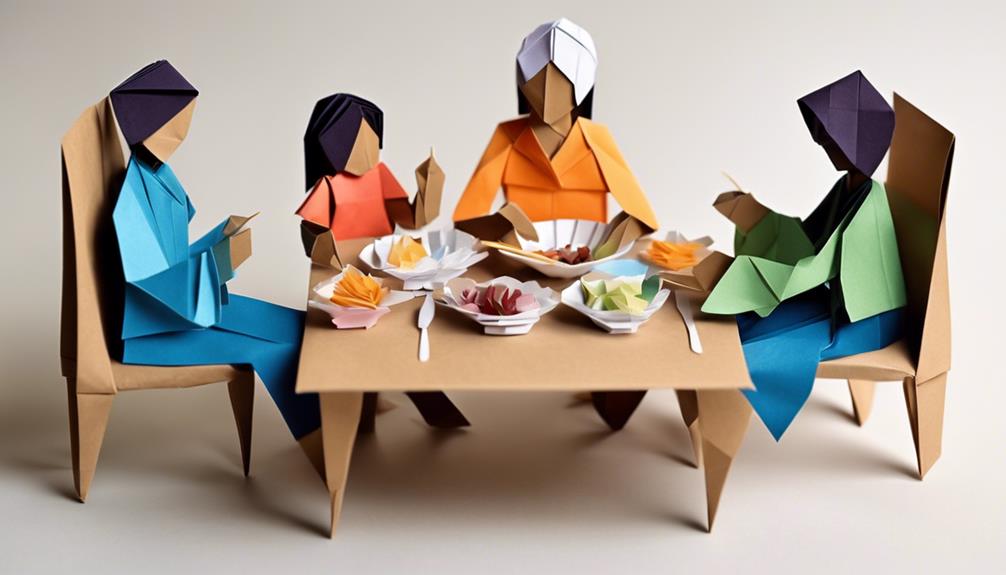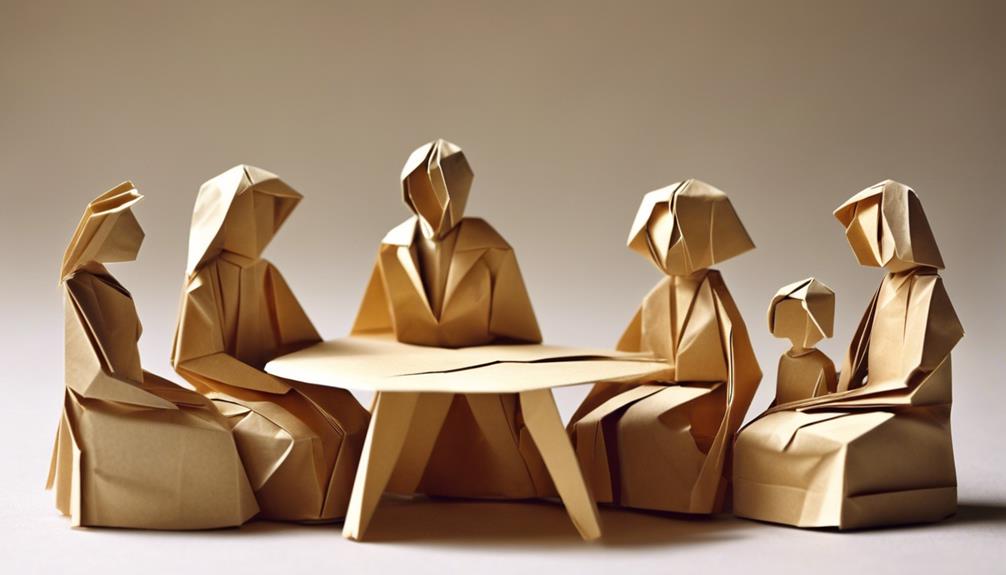To improve your home life, begin by crafting a fresh family narrative that weaves together identity, connection, roles, rituals, and growth. Uncover your family’s distinct identity, establish strong bonds through meaningful traditions and open dialogue, and redefine responsibilities for a peaceful coexistence. Encourage personal development, embrace change collectively, and foster a positive household atmosphere. By incorporating customs, providing nurturing support, and evolving together, you can establish a gratifying and serene family dynamic that resonates with all members. This comprehensive approach to family living will bring happiness, solidarity, and resilience to your household, enriching the well-being of everyone involved.
Key Takeaways
- Create new family rituals for connection and unity.
- Redefine roles based on individual strengths and interests.
- Foster open communication and active listening.
- Establish clear boundaries to promote respect.
- Embrace change collaboratively for a positive home environment.
Discovering Your Family's Identity
Explore your family's unique story and values to uncover the essence of your family's identity. Understanding your family dynamics is essential in defining who you're as a unit. Family dynamics refer to the patterns of interactions, roles, and relationships within your family that shape how you communicate, solve problems, and support one another. By delving into your family dynamics, you can gain insights into the strengths, challenges, and overall functioning of your family.
Recognize the significance of personal narratives and shared memories in shaping your family's identity. These stories and experiences passed down through generations contribute to the fabric of your family's history and values. Reflect on how past experiences, relationships, and cultural heritage have influenced the way your family interacts and connects with one another.
Embrace the diversity within your family unit, acknowledging individual differences while celebrating common values that bind you together. Engage in meaningful conversations, storytelling, and reflection to deepen your understanding of your family's identity and nurture a sense of belonging and connection.
Building Strong Family Connections

Enhance your family's bond by establishing meaningful rituals and traditions that nurture closeness and unity. These practices help people feel connected and create lasting memories.
Engaging in open communication and active listening is essential in promoting understanding and empathy within the family unit. Taking the time to truly listen and communicate effectively can strengthen relationships and build trust among family members.
Encouraging quality time spent together, whether it's through family meals, game nights, or outdoor activities, enhances bonding experiences and fosters a sense of togetherness.
Prioritizing individual and collective well-being through support, encouragement, and validation also plays a critical role in strengthening family relationships. By showing care and understanding, family members can help each other navigate challenges and celebrate successes together.
Embracing vulnerability, sharing stories, and expressing emotions constructively deepen family connections and build resilience, fostering a supportive and loving environment for all.
Redefining Family Roles and Dynamics

When redefining family roles and dynamics, it's essential to contemplate role reassignments for harmony, communication strategies for unity, and setting boundaries for respect.
By reassessing and realigning responsibilities within the family unit, you can promote a more cohesive and supportive environment.
Encouraging open dialogue and establishing clear expectations can lead to stronger bonds and a sense of shared purpose among family members.
Role Reassignments for Harmony
Redefining family roles within your household can pave the way for a more cohesive and harmonious living environment. By assigning roles based on individual strengths and interests, you can create a balanced dynamic that promotes teamwork and cooperation among family members. This reevaluation allows for a more effective distribution of responsibilities, reducing stress and fostering unity. Embracing new family roles can lead to improved communication and understanding, enhancing the overall quality of your home life.
| Role | Responsibilities | Strengths |
|---|---|---|
| Parent 1 | Managing finances, meal planning | Organization skills, culinary expertise |
| Parent 2 | Household chores, kids' schedules | Attention to detail, time management |
| Child 1 | Homework, pet care | Academic aptitude, empathy |
| Child 2 | Yard work, setting the table | Physical strength, helpful nature |
| Child 3 | Cleaning shared spaces, recycling | Organization, eco-conscious mindset |
Communication Strategies for Unity
To establish a more unified and harmonious family dynamic, clear and open communication is essential when redefining family roles and dynamics. Critical communication strategies play a crucial role in fostering unity and understanding among family members, creating a harmonious environment within the household.
Addressing unresolved issues through open dialogue allows for healing and growth, positively transforming the family story. By openly discussing family dynamics and setting clear expectations, healthier relationships and improved interactions can be achieved.
Open dialogue and active listening are key components in redefining family roles and dynamics, paving the way for a more cohesive and supportive family unit. Implementing communication strategies such as regular family meetings, active listening, and expressing thoughts and feelings in a respectful manner can help in establishing new expectations and responsibilities within the household.
Through these strategies, family members can work together to create a more harmonious and unified family dynamic.
Setting Boundaries for Respect
Establishing clear boundaries within your family dynamic is essential for fostering respect and promoting healthy relationships. By redefining family roles and setting boundaries, you can help create a supportive and harmonious home environment.
These boundaries allow for clear communication, mutual understanding, and autonomy for each family member. When everyone respects these boundaries, it fosters individuality within the family unit and contributes to a positive shift in family dynamics and interactions.
Boundaries not only help in defining roles but also aid in maintaining a balance between personal space and shared responsibilities. They provide a framework for behavior and expectations, ensuring that everyone's needs are considered and respected.
Setting boundaries for respect is a proactive approach to building a strong family foundation based on mutual understanding and consideration. This practice can lead to improved communication and a more harmonious atmosphere within your home.
Creating a Vision for Your Family

Crafting a clear vision for your family involves defining values, goals, and aspirations. This process includes creating a family vision statement that serves as a guiding light for decision-making and helps prioritize family activities.
By aligning individual and collective dreams, you can establish a sense of purpose and unity within your household. Regularly revisiting and updating your family vision promotes growth, adaptability, and connection among family members.
To create a compelling vision for your family, consider the following:
- Define your family values to establish a strong moral foundation.
- Set achievable goals that reflect both individual and collective aspirations.
- Create a shared vision statement that encapsulates your family's purpose and direction.
- Establish clear roles and responsibilities based on your family's values and goals.
- Foster open communication to make sure everyone is aligned with the vision and feels heard in the decision-making process.
Incorporating Rituals and Traditions

Incorporating rituals and traditions into your family life can bring a sense of unity and belonging to your household. These practices help strengthen the bonds between family members and create lasting memories that contribute to a shared identity.
Rituals for Connection
Consider how infusing your family life with meaningful rituals and traditions can deepen your connections and create cherished moments together. Incorporating rituals and traditions into your family dynamics is essential for fostering strong bonds and enhancing the sense of togetherness among every child.
Here are some ways to incorporate rituals for connection:
- Family Mealtime: Establish a routine of eating meals together to encourage communication and bonding.
- Bedtime Stories: Share stories before bedtime to create a calming and intimate ritual with your children.
- Weekly Family Outings: Plan regular outings or activities that everyone can look forward to, promoting shared experiences.
- Holiday Celebrations: Create unique traditions for holidays to make them memorable and meaningful for the whole family.
- Gratitude Rituals: Practice expressing gratitude together, whether through daily reflections or a weekly gratitude circle, to foster appreciation and positivity within the family unit.
Family Tradition Ideas
Infuse your family life with a sense of warmth and connection by embracing timeless tradition ideas that foster togetherness and create lasting memories. Incorporating family traditions and rituals not only strengthens family bonds but also provides a sense of continuity and shared experiences across generations.
By celebrating special occasions with meaningful traditions, you can foster a deep sense of belonging and unity among family members. Whether it's holiday traditions, weekly family dinners, or other rituals, these practices offer stability and predictability in family life, creating a strong foundation for your family dynamics.
Embracing family tradition ideas that resonate with your true passions can further enhance the significance of these rituals. From simple gestures to elaborate ceremonies, the key is to choose traditions that hold personal meaning and reflect your family's values.
Fostering Open Communication

To foster open communication within your family, start by actively listening to each other's thoughts and feelings. By encouraging dialogue and truly hearing one another, you can create a space where everyone feels valued and understood.
Here are some key ways to enhance communication within your family:
- Practice Empathetic Listening: Show understanding and compassion towards each other's perspectives.
- Encourage Open Sharing: Create an environment where everyone feels comfortable expressing their thoughts and emotions.
- Respect Differences: Embrace the uniqueness of each family member and listen with an open mind.
- Address Conflicts Constructively: Use communication as a tool to resolve disagreements and strengthen relationships.
- Celebrate Achievements: Share successes and milestones with each other to foster a sense of unity and support.
Nurturing Individual Growth and Support

Create a nurturing environment at home that supports the personal growth and development of each family member. Encouraging individual growth within the family dynamic is essential for fostering a supportive atmosphere.
By actively listening, understanding, and providing empathy, you can effectively nurture each family member's journey. Open communication and validation of emotions play significant roles in promoting personal development.
It's essential to support self-expression and empowerment through storytelling and sharing personal experiences. By doing so, you not only build resilience within each family member but also strengthen the bonds that tie the family together.
Embracing and nurturing individual growth not only benefits the individual but also contributes to the overall well-being of the family unit. Remember, supporting and nurturing each family member's aspirations and personal growth is a continuous process that requires patience, understanding, and a genuine desire to see everyone thrive.
Embracing Change Together

Evolving together as a family can be an exciting journey towards embracing change and creating a new narrative in your home life. To help us navigate this transformation effectively, consider the following tips:
- Collaborate on Redesign Projects:
Working together on revamping your living space can be a tangible way to reflect shared values and aspirations.
- Incorporate Individual Preferences:
Embrace each family member's unique tastes and personalities to create a harmonious and personalized home environment.
- Engage in Meaningful Discussions:
Aligning on visions, goals, and changes through open and honest conversations can pave the way for a transformed family story.
- Adapt to New Routines and Traditions:
Embracing fresh rituals and traditions as a family can shape an inspiring chapter in your home life.
- Support Each Other Through Changes:
Being there for one another during transformations can foster a sense of unity and strength within the family unit.
Cultivating a Positive Home Environment

Cultivating a welcoming atmosphere in your home involves integrating meaningful decor items that reflect your family's unique story and values. Personalizing your living space with family heirlooms and cherished items can evoke fond memories and create a cozy atmosphere. Embracing change in your living arrangements can lead to new adventures, fostering a renewed sense of comfort and belonging.
Downsizing and decluttering play vital roles in adapting to a new life stage, making your living space more functional and welcoming. Reflecting on past experiences while creating new memories can help you embrace traditions and cultivate a comfortable environment for your family. By infusing your home with items that hold sentimental value, you can create a space that not only speaks to your family's past but also sets the stage for a new chapter filled with warmth and positivity.
This blend of nostalgia and anticipation shapes a home environment that's both comforting and inviting, ready to embrace the next stages of your family's journey.
Frequently Asked Questions
What Is the Power of Family Stories?
Family stories hold immense power as they shape identity, values, and connections within your family. Sharing these narratives fosters understanding, empathy, and bonding. They offer a rich tapestry of experiences, traditions, and memories to cherish.
How Storytelling Can Change Your Life?
Storytelling can reshape your existence, revealing hidden truths, igniting new paths. Your tales hold the power to heal wounds, illuminate purpose, and craft a narrative of resilience and self-discovery. Embrace the transformative magic of storytelling.
Why Is Family Narrative Important?
Family narrative is crucial as it shapes your identity, values, and relationships. It provides a sense of belonging and connection to your roots. Understanding your heritage and traditions through storytelling fosters empathy, resilience, and strengthens family bonds.
How Do You Start a Short Story About Your Family?
You start by digging deep into memories, letting them flow like a river. Each moment, a brushstroke weaving a tapestry of laughter, tears, and love. Your family story, a masterpiece painted with the colors of life.
How Can Telling a New Family Story Help Improve Family Issues at Home?
Telling a new family story can be the ultimate guide to peace at home. By reframing the past and focusing on positive experiences, family members can create a stronger bond and understanding. Sharing new narratives can foster empathy, forgiveness, and improve communication, ultimately leading to resolving family issues.
Conclusion
To sum up, transforming your home life starts with discovering your family's identity and building strong connections. By redefining roles, creating a vision, and incorporating rituals, you can foster open communication and support individual growth.
Embrace change as a family and cultivate a positive home environment together. Remember, the journey of telling a new family story is an ongoing process that requires dedication and commitment to create a harmonious and fulfilling life for all.









